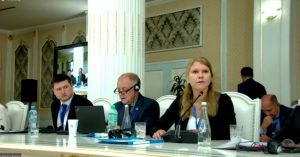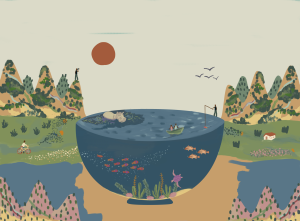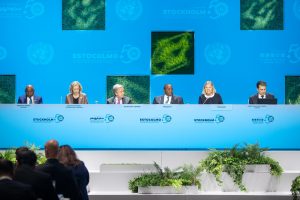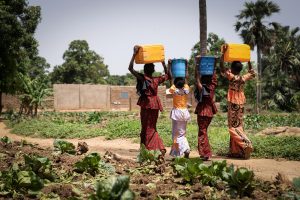- SIWI – Leading expert in water governance
- /
- Latest
- /
- Water Dialogues – A Water-Literate Society
Water Dialogues – A Water-Literate Society
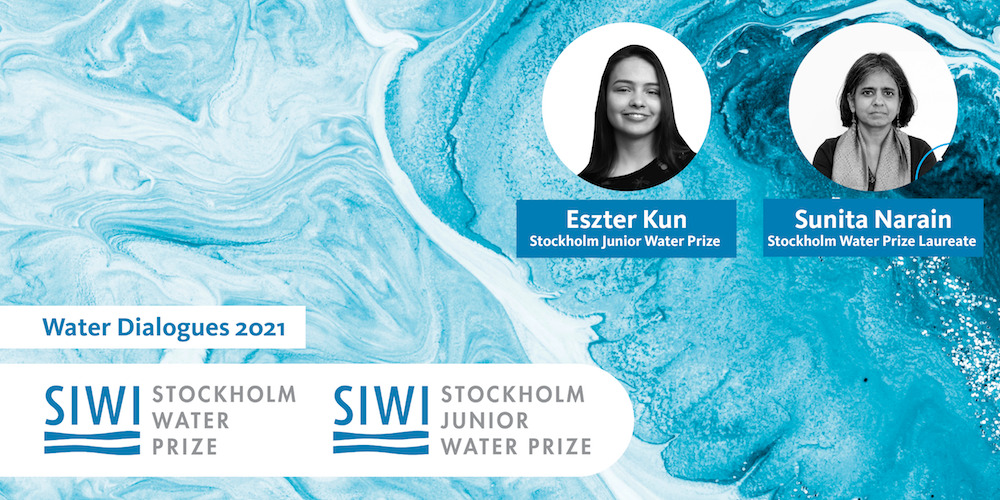
Participants who tuned in to this week’s Water Dialogued were treated to quite a discussion! From innovation to communication and the acknowledgement that research isn’t always as hard as it looks, we were joined by water experts of today and tomorrow from three different continents.
The previous Water Dialogues webinar took a deep dive into groundwater as a topic, and this week we focused on how to create a water-literate society. Panchali Saikia, SIWI’s expert in water resilience and urban issues in water governance, was the moderator. She opened up by talking about the importance of her take-aways from her own research in the City Water Resilience Approach project. These were: how communities organize themselves, the inclusion of traditional practices and knowledge, and thirdly: partnerships as a crucial tool.
Dr. Sunita Narain called in from New Delhi, India, and discussed her work at the Centre for Science and Environment (CSE) and their extraordinary progress on rainwater harvesting. Eszter Kun, a 15-year-old high school student from Hungary also joined the conversation and taught us about her aquaponic system which she built and ended up presenting at World Water Week in Stockholm.
“Cute, but not serious” | Those were the words used to describe the rainwater harvesting work of Sunita Narain and CSE. But that was 15 years ago and today, rainwater harvesting is the way to practice water management. The water management field has evolved since that comment but Sunita stressed the importance of continuing to work hard to strengthen the connection between the community and their water. Water bureaucracy often stands in the way and the key in Sunita’s view is to decentralize the water management.
Growing | Eszter Kun stumbled upon aquaponics on Pinterest when searching for Christmas gifts. They are striking: looking like a tray of plants on top of an aquarium. It turned out to be trickier than Eszter first imagined: she re-built her aquaponic system when her plants did not grow, and she measured the nutrients of the water to identify the problem in her system. In doing this, she realized what a valuable educational tool she had built, and it became her mission to not only nurture plants, but also minds.
The glass ceiling of new ideas | Sunita mentioned that the all-female panel are probably used to glass ceilings, but that glass ceilings also exist in the context of new ideas. It is very difficult to introduce new ideas and new ways of thinking (for example: rainwater harvesting). It is crucial though, as we need new innovative solutions to existing problems. “Good research is important for society to look at what’s possible”, said Sunita. She also explained that it isn’t rocket science, which Eszter agreed with! Growing up, Eszter saw researchers as elusive big men in white coats, only to realize that she had already done something which counted as research at the age of 15. The young people of today are the researchers of tomorrow who will help us change the world. That is why it is important to empower them, give them the space and time to develop the research and ideas which will contribute to a better tomorrow for all.
Keep the idea alive | As a natural continuation of research and innovation, advocacy was also discussed during the webinar. “We need ideas to be practiced at scale”, Sunita said and continued saying that “we have to invest in building a societal understanding”. Concerning advocacy, she summarized: “There is no one single article which goes into the archives, but it’s about being able to persuade, cajole and to influence people to think differently, to practice differently.
Listen to the full conversation here, with presentations and a Q&A!
Don’t miss our new Water Dialogues – follow the #waterdialogues on SIWI and Swedish Water House social media channels and sign up to receive Swedish Water House’s newsletter!
Read the newly released State of India’s Environment 2021, published by CSE.
For those who missed the first webinar in the series (watch recording), the Water Dialogues is a webinar series, hosted by Swedish Water House at SIWI. Each webinar features one Stockholm Water Prize winner and one Stockholm Junior Water Prize national winner, in a joint conversation about a shared research topic. The audience is invited to a relaxed conversation with top researchers, bright young minds and (possibly) new water topics.


